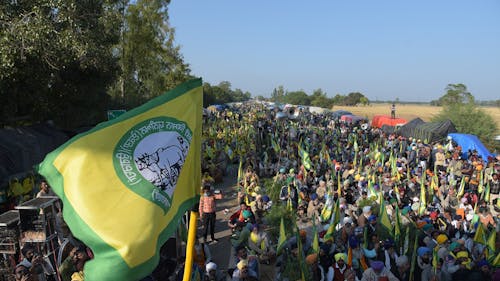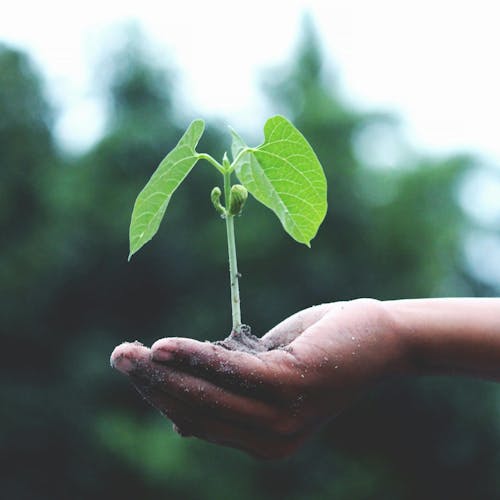Farmers are still protesting in India: Here's why you should care

You may or may not have seen #StandWithFarmers on your social media timelines. Farmers in India have been protesting for months — with hardly any coverage from Western media outlets. The protests have been called the largest protests in human history, and it’s about time the rest of the world start taking notes.
What’s going on?
For most Indians, agriculture is their means of livelihood, especially for owners of small, local farms. From 2018 through 2019, the average Indian farmer earned approximately $140 per month, and “many solely rely on farming to put food on their own table and (a) roof over their head,” according to CNN.
Indian Prime Minister Narendra Modi’s Bharatiya Janata Party (BJP) passed three agricultural laws in September that are set to deregulate India’s agricultural industry. If you don’t know anything about Modi, I'm begging you to start paying attention to his actions in India — he's a significant player in the rise of “burgeoning autocrats."
The farmers have said that these laws will make the already difficult plight of farmers worse by making them sell directly to corporations — taking away the "meager support granted to farmers already deprived of much of the support they need.” Without the government, there's little stopping large corporations from further exploiting the farmers.
India’s deregulation and privatization schemes since the 1990s have affected farmers severely, and the coronavirus disease (COVID-19) pandemic and recession in India have only exacerbated these issues, according to Slate.
To get a crash course on why the farmers are protesting, watch (and share) this less-than-2-minute video.
The protests started in August 2020, with farm and trade unions joining together. On Nov. 25, 2020, the police used tear gas and water cannons against protestors, with viral images making waves across the internet.
Many of the farmers are Sikh, a marginalized community in India, and as a result, “authorities have made baseless claims against activists of incitement,” according to Human Rights Watch.
This means that the authorities are not only lying to the public to diminish the gravity of this situation, but are aiming to fully silence the already unheard. Essentially, those that are the most vulnerable are experiencing the worst consequences for protesting.
Greta Thunberg and Rihanna are among some of the few celebrities who have shared their support for the farmers. Rihanna’s tweet that questioned why the protests haven’t been talked about was met with backlash from Indian celebrities, the foreign ministry and supporters of the BJP.
Why should you care?
For many Rutgers students, it may seem like you have absolutely zero stake in this and that you shouldn’t care — but this is the furthest thing from the truth.
The first thing to recognize is that we're all globally connected — what happens across the world inherently affects us all.
The farmer protests affect your food, too. India is the world’s largest producer and exporter of spices such as ginger, curry powder, turmeric and many others. It's also the second largest producer of rice, wheat and other cereals. It may also affect the textile industry, as India is the lead producer of cotton.
But outside of how these protests affect our consumption, the more important thing to take note of is the intense organizing that's making these protests possible.
During the Spring 2019 semester, the Rutgers American Association of University Professors and American Federation of Teachers (AAUP-AFT) authorized a strike to “defend quality public education," according to then-president of the AAUP-AFT Deepa Kumar, professor in the Department of Journalism and Media Studies, as reported by the the Daily Targum.
Threatening strikes — and having the might behind those statements — really works, and we’ve seen it in our own community. What could happen if we students organized against our grievances? (COUGH, COUGH, TUITION.) What would happen if we paid attention to such tactics and implemented them in our communities?
Thinking outside of the Rutgers bubble, these tactics are going to be important if we want to survive a world that is increasingly privatized. What is happening in India is a bleak example of what can happen when private corporations take over public enterprises.
Additionally, there've been intense human rights violations that we just simply cannot ignore, including internet shutdowns and the disappearing and alleged assault of Dalit labor activist Nodeep Kaur.
What can you do?
Stay informed, and repost important information to spread the word and put pressure on the Indian government. (There are definitely pros and cons to the “insta infographic industrial complex” and we’ll definitely come back to that, but for now it’s what we’ve got). Talk about it with everyone you know.
This is literally “the largest proletariat uprising in history,” organizing in the face of an oppressive regime. Do not let it go unnoticed. #StandWithFarmers.



